
Palaeontographica Abteilung B-Palaeophytologie Palaeobotany-Palaeophytology
metrics 2024
Bridging the Past and Present of Plant Evolution
Introduction
Palaeontographica Abteilung B-Palaeophytologie Palaeobotany-Palaeophytology is a distinguished journal published by E SCHWEIZERBARTSCHE VERLAGSBUCHHANDLUNG in Germany, focusing on the intricate study of paleobotany, including the evolution and diversity of plant life throughout geological time. With an impressive Scopus ranking of #25 out of 113 in the field of paleontology, the journal is recognized for its contribution to advancing our understanding of ancient ecosystems, earning a prestigious Q2 quartile ranking in 2023. Despite its lack of open access options, the journal provides invaluable insights for researchers, professionals, and students alike who are passionate about exploring the fossil record and its implications for plant evolutionary history. The journal's collaborative nature and periodic publication schedule, ranging from 2005 to 2024, ensure that it remains at the forefront of paleontological research.
Metrics 2024
 -
- 2.00
2.00 1.90
1.90 -
-Metrics History
Rank 2024
IF (Web Of Science)
JCI (Web Of Science)
Quartile History
Similar Journals

Fossil Record
Unlocking Secrets of the Ancient WorldFossil Record is a prestigious open access journal pioneering the field of paleontology, published by Pensoft Publishers in Germany. Since its inception in 1998, it has provided a vital platform for the dissemination of groundbreaking research that advances our understanding of ancient life and environmental change through time. Holding an impressive Q2 quartile ranking in the field and securing a notable position among the top 73rd percentile of paleontological journals, Fossil Record ranks #31 out of 113 in the Scopus classification of Earth and Planetary Sciences. With a commitment to quality and accessibility, the journal not only encourages critical dialogue among researchers, professionals, and students but also promotes the sharing of knowledge worldwide. Explore its comprehensive repository of articles to stay abreast of the latest findings that shape our understanding of the planet’s history.
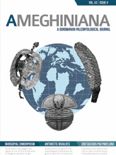
AMEGHINIANA
Advancing Research in Ecology and Evolutionary ScienceAMEGHINIANA is a distinguished academic journal published by the ASOCIACION PALEONTOLOGICA ARGENTINA, serving as a vital platform for the dissemination of cutting-edge research in the fields of Ecology, Evolution, Behavior and Systematics, as well as Paleontology. With its ISSN 0002-7014 and E-ISSN 1851-8044, the journal has established itself as a key reference point for scholars seeking to explore the intricate relationships within ecological systems and the evolutionary history of species. Despite not offering open access, AMEGHINIANA maintains a reputation bolstered by a Q3 ranking in both its subject categories, underlining its sustained commitment to enhancing scientific knowledge. Researchers and professionals alike benefit from this journal’s extensive archive of studies dating back to 1985, with ongoing contributions expected until 2024. With a focus on high-quality content, this journal is essential for anyone immersed in the study of paleobiology and ecological systems.

Swiss Journal of Palaeontology
Illuminating the Pathways of EvolutionSwiss Journal of Palaeontology, published by SPRINGER INT PUBL AG, stands as a leading platform for innovative research within the field of paleontology, contributing significantly to the understanding of Earth's historical life forms and their evolutionary pathways. With its ISSN 1664-2376 and E-ISSN 1664-2384, this journal has established a strong presence in academic circles, recognized as a Q1 journal in the category of Paleontology for 2023. Moreover, it ranks 20th out of 113 in the Earth and Planetary Sciences, securing an impressive 82nd percentile on Scopus, underscoring its influence and reach in the scientific community. The journal publishes cutting-edge research findings, theoretical advancements, and comprehensive reviews that span the globe, making it an essential resource for researchers, professionals, and students in the paleontological sciences. For those interested in contributing to and learning from the latest discoveries, the Swiss Journal of Palaeontology promises to be an invaluable addition to your academic library.

IAWA JOURNAL
Shaping the Future of Forestry ResearchIAWA JOURNAL is a distinguished academic publication dedicated to the fields of forestry and plant science, published by BRILL, a reputable name in scholarly publishing. With an ISSN of 0928-1541 and an E-ISSN of 2294-1932, the journal has garnered impressive rankings within Scopus, placing 48th in Forestry and 182nd in Plant Science, indicating its strong influence and relevance in these scientific areas. Operating from the Netherlands, the IAWA JOURNAL focuses on a broad scope of research themes, contributing to the advancement of knowledge from its inception in 1980 and continuing robustly through to 2024. With a Category Quartile of Q2 in Forestry and Q3 in Plant Science as of 2023, the journal serves as a vital resource for researchers, professionals, and students alike, facilitating the exchange of innovative ideas and significant findings in the plant biology community. Although the journal does not currently offer open access, it remains a pivotal platform for disseminating high-quality research that shapes the future of the ecological and environmental sciences.
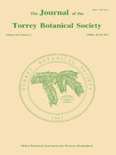
JOURNAL OF THE TORREY BOTANICAL SOCIETY
Bridging research and accessibility in the field of botany.JOURNAL OF THE TORREY BOTANICAL SOCIETY is a prominent academic journal dedicated to advancing the fields of botany and ecology, published by the esteemed TORREY BOTANICAL SOCIETY. With an ISSN of 1095-5674 and an E-ISSN of 1940-0616, this journal serves as a critical platform for researchers, professionals, and students to share their findings and insights. Despite its status in the Q4 category for the 2023 rankings across Ecology, Plant Science, and Ecology, Evolution, Behavior and Systematics, the journal continues to foster significant discourse and collaboration in the botanical sciences, aiming to elevate the understanding of plant biology and ecosystems. Its open access options enhance accessibility, ensuring that groundbreaking research reaches a wider audience. Published in the United States, the journal features work from both established scientists and emerging scholars, making it a vital resource for anyone involved in the study of plants and their environmental interactions. Explore the JOURNAL OF THE TORREY BOTANICAL SOCIETY to engage with cutting-edge research and contribute to the ongoing dialogue in the botanical sciences.
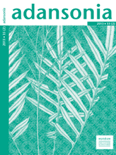
ADANSONIA
Connecting scholars for a greener tomorrow.ADANSONIA is a distinguished, peer-reviewed open access journal dedicated to advancing the field of plant science. Published by the Publications Scientifiques du Museum in Paris since 2000, this journal serves as a critical platform for sharing innovative research and discoveries in botany, ecology, and related disciplines. With its ISSN 1280-8571 and E-ISSN 1639-4798, ADANSONIA boasts a notable Scopus rank of #383 in the Agricultural and Biological Sciences category and a 2023 category quartile ranking of Q3 in Plant Science, indicating a meaningful contribution to the academic community. The journal's scope encompasses a broad range of topics, making it a vital resource for researchers, professionals, and students alike who are exploring the complexities of plant biology. Based in France, ADANSONIA not only enhances visibility for groundbreaking research but also facilitates open communication amongst scholars, ensuring that knowledge on plant science is accessible worldwide. Located at CP 39-57, Rue Cuvier, F-75231 Paris Cedex 05, France, this journal stands as a testament to the collaborative efforts in the pursuit of scientific excellence in plant sciences.
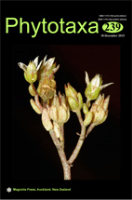
Phytotaxa, published by MAGNOLIA PRESS, is an esteemed journal in the fields of Plant Science and Ecology, Evolution, Behavior and Systematics. Established to cater to the growing need for high-quality research dissemination in botany, this journal presents the latest findings in plant taxonomy, systematics, and biodiversity. With its H-Index reflecting significant academic influence, and recognized as Q2 in Plant Science and Q3 in Ecology by Scopus, it stands as a reputable source for scholars and practitioners alike. The journal operates without open access restrictions, allowing for a wider reach to its audience. Positioned in New Zealand, Phytotaxa has been pivotal since its inception, contributing to the global understanding of plant diversity and ecology from 2010 to 2024. Its rigorous peer-review process ensures the high quality of published articles, making it an essential resource for researchers, professionals, and students dedicated to advancing the field of botany.
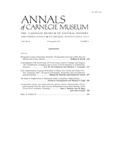
ANNALS OF CARNEGIE MUSEUM
Exploring Earth's Secrets: A Scholarly Journey Through Natural HistoryANNALS OF CARNEGIE MUSEUM, published by the Carnegie Museum of Natural History in the United States, stands as a significant forum for scholarly research in the fields of Ecology, Evolution, Behavior, Systematics, and Geology. With an established history from 1990 to 2024, this journal caters to the scientific community by fostering the dissemination of high-quality, peer-reviewed articles that enhance our understanding of Earth's biological and geological processes. Notably recognized in the 2023 category quartiles, the journal ranks in Q2 for both Ecology and Geology, showcasing its importance and relevance in these disciplines. Although it currently does not offer open access options, the journal's rigorous editorial standards and impactful research, evidenced by its Scopus rankings, make it an indispensable resource for researchers, professionals, and students aiming to contribute to the advancing knowledge of natural history. The ISSN 0097-4463 and E-ISSN 1943-6300 facilitate easy access to its comprehensive archives, ensuring that vital insights into the natural world are readily available for ongoing scholarly exploration.
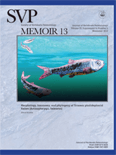
JOURNAL OF VERTEBRATE PALEONTOLOGY
Advancing Knowledge in Vertebrate PaleontologyJOURNAL OF VERTEBRATE PALEONTOLOGY, published by Taylor & Francis Inc, is a premier academic journal dedicated to advancing the field of vertebrate paleontology. With a strong emphasis on both traditional and innovative research methods, this journal provides a platform for the dissemination of influential studies and discoveries that shape our understanding of vertebrate evolution and their ecological contexts. Operating under an ISSN of 0272-4634 and an E-ISSN of 1937-2809, it covers research published since 1981 and aims to foster a collaborative environment for researchers, professionals, and students alike. The journal is currently ranked in the Q2 category of Paleontology, standing at position #45 among 113 in its Scopus category, which underscores its significant contribution to the academic community. As a crucial resource for scholars, JOURNAL OF VERTEBRATE PALEONTOLOGY provides insights that not only enrich academic discourse but also stimulate further research and exploration in a field that bridges biology, geology, and conservation.

VEGETATION HISTORY AND ARCHAEOBOTANY
Revealing the Secrets of the Past Through Vegetation StudiesVegetation History and Archaeobotany is an esteemed academic journal published by Springer, dedicated to the exploration of the interactions between vegetation, human activity, and the archaeological record. With its history spanning from 1992 to 2024, the journal has established a significant presence in the academic community, particularly with its strong impact reflected in its Q1 rankings across diverse fields such as Archaeology, Paleontology, and Plant Science. The journal consistently ranks among the top publications, achieving remarkable positions such as 12th in Archeology and 9th in Paleontology according to Scopus, which underscores its influence and quality in the field. Aimed at researchers, professionals, and students alike, Vegetation History and Archaeobotany serves as a crucial resource for those seeking to understand the pivotal role of plant remains in reconstructing past environments and human interactions. Readers can expect to find rigorously reviewed articles that contribute to the ongoing discourse in vegetation studies and archaeological science.